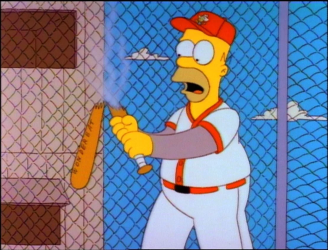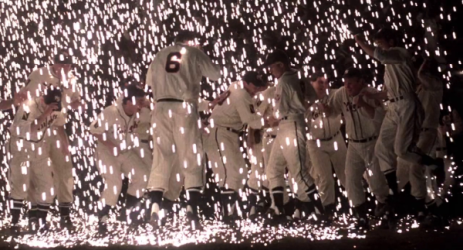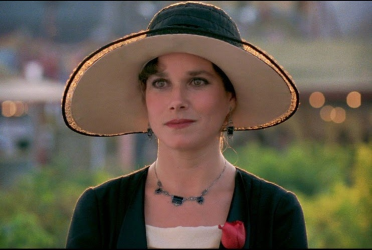It was hard to get the kids interested in the baseball movie month at the local Bijou, and I wasn’t really up to pushing The Bad News Bears very hard so we missed that one. However, The Boy loves him some classic Simpsons, and The Flower some Randy Newman, so I could pitch this as “The movie ‘The Simpsons’ was parodying in their softball episode with the classic Randy Newman score!” and they bought it.

o/~I’m talking sooft-ball~\o
The Flower bought it so hard that she called it “The Randy Newman movie with Sundance“. I couldn’t dissuade her from this, no matter how hard I tried.
But the film has a hell of a pedigree. It was Barry Levison’s (last seen by us directing the plague flick The Bay) follow up to his classic film Diner. Besides Robert Redford, it features Robert Duvall, Glenn Close, Kim Basinger and Barbara Hershey as well as some of the great character actors of the era: Wilford Brimley, Richard Farnsworth, Robert Prosky and Joe Don Baker.
Of course, when Baker was on screen I had to yell “Mitchell!”. Every time. (OK, I just whispered it to The Flower but she was adequately annoyed for the whole audience.)

Muh-muh-muh-Mitchell!
The screenplay was by Phil Dusenberry (who didn’t do much else) and Roger Towne, which makes you think, “Oh, the guy who wrote Chinatown!” But it’s not him. That was Robert Towne, who is apparently Roger’s overachieving brother. Nonetheless, it’s a fine script based on Bernard Malamud’s book.
The music is no less than iconic. G’wan. Sing it with me now.
buh-BUHHHH! buh-Buh-buh-BUHHHHH!
You can see the night game lights exploding in a shower of sparks, can’t you?

There. Now you don’t even need to use your memory.
Great, thinly disguised morality tale of a boy who goes off to the city after leaving home and his girl, and ends up getting blasted by Barbara Hershey and never fulfilling his destiny of being The Greatest Ballplayer Of All Time.
I say “thinly disguised” but I should probably just go ahead and say “transparent”. This is a ridiculously simple story of good vs. evil, and sin and redemption. Redford plays Roy Hobb, the world’s oldest nineteen-year-old (he was 48, and the lighting does an admirable job hiding this, but there’s only so much darkness can do) whose true love Iris (Close, who doesn’t look much younger, at 37) gives him a farewell present before he goes off to the Big Leagues.
But he’s not on the train five minutes before he’s spotted by Barbara Hershey (actually a year younger than Close, but playing an older character) and, hey: Barbara Hershey!

Easy on the eyes, hard on the baseball career.
Unfortunately, his probably not very innocent trip to her room ends with a botched murder/suicide and cut to fifteen years later and a tryout for team run by evil The Judge (Prosky). Pop (Brimley) runs and part owns the team, but he’ll lose it if to The Judge he can’t take ’em to the championship. The last thing he wants is a broken down forty-eight—er thirty-four-year old starter, but the joke turns out to be on him (and the Judge) when Roy smacks the ball outta the park with ridiculous frequency.
Dubious sports journalist Max Mercy (Duvall) introduces him to Memo Paris (Kim Basinger) in fairly obvious ploy to ruin him (because, honestly, who wouldn’t want to be ruined by Basinger?) and this strategy is as effective as it is elusive to Roy. Before you know it, the Mudhens (or whatever the team name is) are in jeopardy of losing their shot at the pennant, and Roy’s lifelong ambition is in danger of not being fulfilled. (But again: Kim Basinger.)

When is she sincere? Who knows. But easy on the eyes and hard on the…
Things turn around when the team has a series of away games (as in away-from-Memo) and in Chicago a mysterious woman in White—long forgotten Iris—catches his eye. Before you know it, he’s putting the balls back over the fence and beginning to see through Memo (who is actually a genuinely tragic character in the film, both in her bought-and-paid-for nature and her yearning for something better).
An old man leaving the theater said “They don’t make ’em like that any more.”
Indeed, they do not. Truth be told, they didn’t make them like this in 1984. It’s an utterly bizarre throwback that would’ve been at home in the ’50s. But the magic of ’80s Barry Levinson is that it all works, somehow. Sure the acting is good, the lighting is inspired, the music iconic, and it has an overwhelming desire (as I’ve noted of a lot of surprisingly great films) to entertain.
This is something that It Happened One Night and Sleepless in Seattle have in common, and The Natural is similarly inclined, but in the case of The Natural, even the most minor scenes develop the story. It’s enough to make the whole “magical realism” thing seem perfectly…em…natural (sorry).
The kids loved it, and it made it much easier to get them to Field of Dreams the next week.

Later, Close would become synonymous with “bunny boiler”.

One thought on “The Natural (1984)”